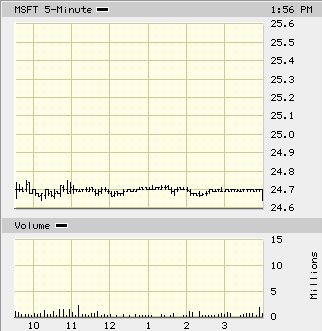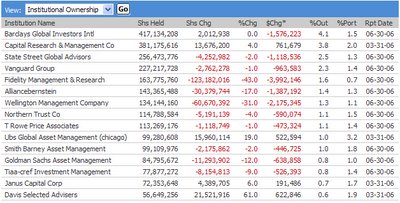Transparency? Well, it ain't AERO Glass, that's for sure.
Continuing my recent theme of whether we're seeing performance for the massive collective compensation we're underwriting at MSFT (much to the dismay of several employees, apparently, based on their subsequent comments), I did some research to see what payout MSFT finally decided on with respect to the Shared Performance Stock Awards (SPSA's).
For those who don't recall, in 2004, MSFT instituted the SPSA program as "a long-term incentive program for executives and other senior leaders that makes a significant portion of their stock-based compensation dependent upon the company's growth and customer satisfaction over a three-year period." This group was comprised of the so-called "top 500" executives (now magically morphed to at least 600 given the rabbit-like nature of MSFT's headcount multiplication) or effectively the supposed top brain trust of the entire company. To the best of my knowledge, the actual metrics were never publicly disclosed beyond that vague "company growth and customer satisfaction" drivel. Some of that makes sense competitively, but having virtually all of it be secret doesn't, and makes it impossible to independently verify subsequent performance against those objectives.
The payout amount was to "be determined by adjusting upward or downward from the target in a range between 33% and 150%". The target, by the way, was set at 31.7M shares. So where did it end up? Turns out, that's easier asked than answered. In reviewing the recent 10-K which you can find here, we see the following:
The performance period for SPSAs issued in fiscal years 2004, 2005, and 2006 was July 1, 2003 through June 30, 2006 (January 1, 2004 through June 30, 2006 for certain executive officers). Following the end of the performance period, the Board of Directors determined that the number of shares of stock awards to be issued was 37.0 million, based on the actual performance against metrics established for the performance period.
This seems to answer what the final amount was: 37M shares versus the original target of 31.7M - an increase of ~17%. So was the final sliding-scale payout %, arrived at by the board of directors and based on performance against these publicly unavailable (and therefore unverifiable) metrics, 117%? Good question. Of course, since I pointed out that the "top 500" has likely morphed to at least 600, maybe that bumped up the actual versus the target? That could be consistent with rumors that the final payout % was 101%. But wait, MSFT is committed to transparency, right? So there's no way they wouldn't tell shareholders what payout % they finally arrived at on these singularly important metrics, for these critical employees, and given the significant $ involved (~$1B), correct? Well, not surprisingly, I couldn't find that articulation in plain English anywhere. So I fired up my email and put the question to MSFT Investor Relations. Here's their response (which, I should point out, was at least timely, as usual):
While we do not disclose the percentage for the SPSAs, you can view the number of shares to be issued under the recently completed SPSA performance period in our Form 10K filing on our Investor Relations website at http://www.microsoft.com/msft/SEC/default.mspx. Below is an excerpt from the 2006 10K filing, which discloses that information.
In other words, the % is none of my business - or yours, for that matter. Why is that? What could possibly be jeopardized by telling us that, for example, the payout was 90% or 102.3%? There doesn't seem to be any obvious operational or competitive explanation for withholding that info - especially given the company's commitment to transparency (cough, sputter, wink). And clearly, as a shareholder, it would be nice to have some relative feeling for how the management team assesses its own performance over the past 3 years. But there is a pretty obvious political explanation - a management team giving themselves 100%+ bonuses during a time period when the company was plagued by product delays, delivered its worst YOY growth rate in its history as a public company, and badly lagged every major market index (to name only a partial list), isn't great optics or likely to sit well with frustrated shareholders - or potential investors.
Oh, and in the MSFT spirit of arguing that one approach provides better alignment with shareholders, only to later change it and argue the reverse, the new SPSA program will be yearly not every 3 years:
The Company will grant SPSAs for fiscal year 2007 with a performance period of July 1, 2006 through June 30, 2007.
So does that mean that executives no longer need "longer-term incentives", or that long-term "company growth and customer satisfaction" are no longer goals? I'm sure that by the time the shareholder meeting rolls around, management will tell us how the new and improved 1 year term "better aligns executives with shareholders" - just like the move from 1 to 3 years was meant to do, or the move to grants from options, etc. etc. etc. Not sure about you, but every time I hear MSFT say that they're making compensation changes to better align with my needs, I know that of all the possible outcomes, that particular one is the least likely.



